A Healthy Chef's Guide to Cooking Gluten Free with (Sweet) Potatoes
I've said it before and I'll say it again: sometimes the easiest - and best - comfort food is a simple baked potato. Luckily for me, there's a holiday made just for potato-lovers like me: today, National Cook a Sweet Potato Day.
What's a girl to do on this potato-riffic holiday? (Besides eat some delicious potatoes, of course). In my case, I thought there would be no better celebration than exploring the health benefits of six different types of potatoes and sweet potatoes - plus plenty of delicious gluten free, vegan and paleo recipes.
Ready to get your potato party started? Then just keep scrolling!
Russet
When it comes to potatoes, you could call russets a cook's (gluten free) bread and butter. These are usually medium or large in size and have a rough, brown skin with a dry, fluffy interior. While russets may have a less-than-stellar reputation, they're also actually quite healthy as long as you don't load them up with all the Steakhouse toppings. One medium russet comes with around 160 calories, 4 grams of fiber, and high levels of vitamin folate, niacin, thiamine and your Vitamin B6 and C.
Here's one tip that can reportedly boost any potato's health stats: simply cook your potato ahead of time and let it cool before eating (or re-heating). This process of cooking then cooling increases the resistant starch in potatoes, which can help prevent constipation, protect against colorectal cancer and improve heart health.
Yukon - Gold or Red
If you want a potato that tastes creamy without having to add any milk or butter, Yukons are your best bet. These are smaller than russets, which also make them a secret weapon when you're only cooking for one. While both varieties have a waxy texture, the gold is often slightly sweeter than the red, so keep that in mind when you're choosing potatoes for a dish.
If it's nutrition that you're worried about, Yukons are another safe bet. One medium gold Yukon potato offers half of your Vitamin C needs (which can also help you absorb more iron from your diet). It's also packed with potassium, which can help lower blood pressure and reduce your risk of heart and kidney disease. You've probably heard the saying that "an apple a day keeps the doctor away." Considering their health benefits and the fact that Yukons are delicious enough to eat like apples, I'd say that cliche could deserve a makeover.
Adirondack Blue
Okay, I'll be honest. Before I typed up this blog post, I only knew these potatoes as the blue-ish, purple-ish potatoes I'd sometimes find at Sprouts and do a happy dance when eating. They look like typical Yukons in shape and size - and even taste the same as a Gold or Red Yukon - but with one big difference: purple skin and insides that turn blue when cooked.
Besides being an Instagrammer's dream, these blue potatoes are arguably the healthiest of regular potatoes thanks to their antioxidants. Studies have also shown that purple potatoes can lower eaters' blood pressure, help prevent blood clots, reduce inflammation in the body (yay antioxidants!), and improve athletes' endurance thanks to their insoluble fiber. This potato is much more than just a pretty addition to your plate!
(Regular) Potato Recipes:
So how can you do to enjoy all the health benefits of these potatoes? To tell the truth, a better question is what can't you do? Some of my favorite ways to eat potatoes include Butterfly Broiled Potatoes (the perfect way to make the most out of Yukon's creamy centers and crispy skin!), Eat the Rainbow Bowls (roasted potatoes + broiled veggies + avocado = a heavenly mix of different tastes, textures and tones) and Loaded Potato Wedge Nachos (if you want to enjoy a baked potato with a Mexican twist, look no further). And, if you're ready to explore vegan sauces, potatoes and veggies can actually be blended into a killer queso!
If those ideas aren't enough, I've also scoured the blogosphere for some potato-perfect recipes (and, full disclosure, there's are only some of the few out of the hundred or so I have bookmarked...). Now, let's dig in!
Okay, first off, the (edible) elephant in the room: the difference between yams and sweet potatoes. I grew up never really knowing (or caring) about the distinction, but a few quick Google searches cleared up my questions. Basically, yams and sweet potatoes are entirely different kinds of tubers. A real "yam" is a starchy root from the Caribbean, and is typically rough, scaly and low in beta carotene. And those red or orange "yams" you've been eating for years (especially at Thanksgiving)? Those are most likely sweet potatoes that American grocery stories have mis-labeled in order to separate them from the "white" sweet potato variety. Who would've thunk?
Now, I included the Garnet and Jewel sweet taters together because they're both very similar: they're orange/red on the inside and out, and have a mildly sweet flavor. Garnet sweet potatoes are typically more moist on the inside, though - which makes them addictively tender when you roast them whole in the oven. Jewel taters, on the other hand, are more firm.
As for nutrition, sweet potatoes are, by the numbers, arguably healthier than yams. Sweet potatoes boast lower calories and score lower on glycemic index (meaning that their carbs are released more slowly and therefore cause less spikes in blood sugar). Orange or red colored sweet potatoes like Jewel and Garnet also pack a punch of beta-carotene, which has been shown to improve blood levels of Vitamin A. Sweet potatoes' bright color has also been found to have anti-inflammatory properties. Apparently your grandma's mashed sweet potato recipe really can be a little magical.
Japanese Sweet Potato
...otherwise known as Casey's favorite potato ever. The skin of a Japanese sweet tater is typically a purple-ish color, but it has a bright white inside. I actually first tasted this variety when my mom bought it by mistake when she was looking for "regular" sweet potatoes - but I'm very glad for her mistake! These potatoes have a much firmer texture and, unlike Garnet sweet potatoes, these don't caramelize easily when roasted in the oven. However, Japanese sweet potatoes' unique flavor is just as good, in my opinion!
Despite tasting very different from its sweet tater cousins, it's just as good nutritionally. One medium Japanese tater comes with around 120 calories, 438 grams of Potassium, 2 grams of protein, 202 percent of your daily Vitamin A needs, 30 percent of your Vitamin C needs and 5 percent of your calcium needs. Like the rest of these potatoes, this variety is also free of fat and cholesterol. Talk about a win.
Stokes Purple Sweet Potato
Finally, my newest discover: purple sweet potatoes! I bought these on a whim when I saw them in Sprouts, and I had no idea what they would taste like - but, as it turns out, pretty good! Compared to other varieties, purple sweet potatoes aren't very sweet, and they're definitely the driest. So, be careful about overcooking them and, if you bake them in the microwave, be sure to include a some water as well.
Thanks to its brilliant color, the purple sweet potato is packed with antioxidants (three times that of blueberries, in fact!) and has been shown to help reduce damage from oxygen and metals in the digestive track. The potatoes' anthocyanins can also have an anti-inflammatory and cancer-fighting properties
Sweet Potato Recipes
When I have sweet potatoes on hand, my usual dinners involve: Loaded Baked Potatoes (the easiest way to use up leftover veggies, beans, or sauces), Salmon Sweet Potato Sliders (which can easily also be stuffed with pulled pork, mashed chickpeas, pulled jackfruit or other kinds of fish!), Sweet Potato Zucchini Patties (a great topping for salads) and leftover sweet potato fries decorating my homemade pizza (trust me: you haven't lived until you've combined fluffy sweet potatoes with a crunchy buckwheat crust).
Need even more ideas? Here are some other sweet ways to enjoy sweet potatoes from around the blogosphere!
Because, when cooking gluten or allergy free, the modest potato might be just the secret weapon you've been looking for!
*Also found at Wine'd Down Wednesday, Wow Me Wednesday, What's Cookin' Wednesday, RunningwithSpoons, This is How We Roll, VegetarianMama, Saucy Saturday, Snickerdoodle Sunday*
What's your favorite kind of regular or sweet potato? How do you like to enjoy your potatoes?
What's a girl to do on this potato-riffic holiday? (Besides eat some delicious potatoes, of course). In my case, I thought there would be no better celebration than exploring the health benefits of six different types of potatoes and sweet potatoes - plus plenty of delicious gluten free, vegan and paleo recipes.
Ready to get your potato party started? Then just keep scrolling!
Russet
When it comes to potatoes, you could call russets a cook's (gluten free) bread and butter. These are usually medium or large in size and have a rough, brown skin with a dry, fluffy interior. While russets may have a less-than-stellar reputation, they're also actually quite healthy as long as you don't load them up with all the Steakhouse toppings. One medium russet comes with around 160 calories, 4 grams of fiber, and high levels of vitamin folate, niacin, thiamine and your Vitamin B6 and C.
Here's one tip that can reportedly boost any potato's health stats: simply cook your potato ahead of time and let it cool before eating (or re-heating). This process of cooking then cooling increases the resistant starch in potatoes, which can help prevent constipation, protect against colorectal cancer and improve heart health.
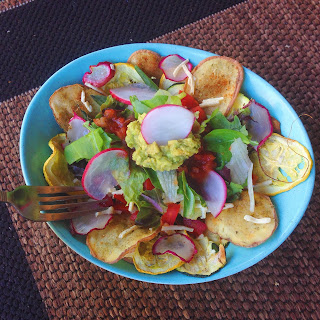 |
| Nacho mama's nachos! |
Yukon - Gold or Red
If you want a potato that tastes creamy without having to add any milk or butter, Yukons are your best bet. These are smaller than russets, which also make them a secret weapon when you're only cooking for one. While both varieties have a waxy texture, the gold is often slightly sweeter than the red, so keep that in mind when you're choosing potatoes for a dish.
If it's nutrition that you're worried about, Yukons are another safe bet. One medium gold Yukon potato offers half of your Vitamin C needs (which can also help you absorb more iron from your diet). It's also packed with potassium, which can help lower blood pressure and reduce your risk of heart and kidney disease. You've probably heard the saying that "an apple a day keeps the doctor away." Considering their health benefits and the fact that Yukons are delicious enough to eat like apples, I'd say that cliche could deserve a makeover.
Adirondack Blue
Okay, I'll be honest. Before I typed up this blog post, I only knew these potatoes as the blue-ish, purple-ish potatoes I'd sometimes find at Sprouts and do a happy dance when eating. They look like typical Yukons in shape and size - and even taste the same as a Gold or Red Yukon - but with one big difference: purple skin and insides that turn blue when cooked.
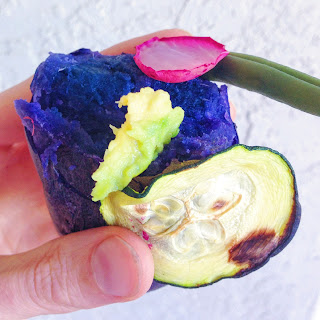 |
| Those blue potatoes! |
(Regular) Potato Recipes:
So how can you do to enjoy all the health benefits of these potatoes? To tell the truth, a better question is what can't you do? Some of my favorite ways to eat potatoes include Butterfly Broiled Potatoes (the perfect way to make the most out of Yukon's creamy centers and crispy skin!), Eat the Rainbow Bowls (roasted potatoes + broiled veggies + avocado = a heavenly mix of different tastes, textures and tones) and Loaded Potato Wedge Nachos (if you want to enjoy a baked potato with a Mexican twist, look no further). And, if you're ready to explore vegan sauces, potatoes and veggies can actually be blended into a killer queso!
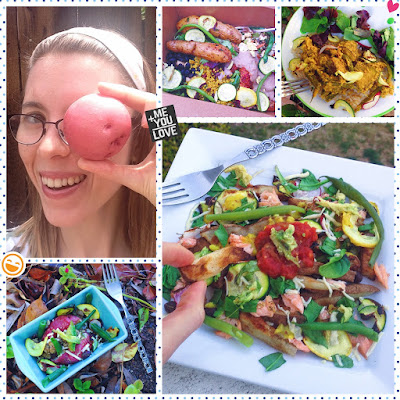 |
| A regular potato roundup! |
If those ideas aren't enough, I've also scoured the blogosphere for some potato-perfect recipes (and, full disclosure, there's are only some of the few out of the hundred or so I have bookmarked...). Now, let's dig in!
- Chunky Potato and Zucchini Soup: yet another addictive recipe for vegan comfort food from one of my favorite bloggers, The Vegan 8.
- Kale Mashed Potatoes: what kind of potato lover would I really be if I didn't include some form of mashed potatoes?!?
- Turkey Enchilada Pie with Mashed Potato Crust: I will never understand how people think to use mashed potatoes as a casserole crust...but I will be forever grateful.
- The 4-Step Potato Pizza Crust: because combining two of my favorite food groups definitely needed to happen.
- Slow Cooker Potato, Chickpea and Beet Greens Curry: when you need a cozy comfort food that will cook all day while you work...
- Honey Baked Ham Potato Empanadas: empanadas just got a deliciously gluten free (and potato-packed) makeover.
- Whole 30 Potato Salad: when you want a potato salad that is about as allergen-friendly and paleo as possible.
Okay, first off, the (edible) elephant in the room: the difference between yams and sweet potatoes. I grew up never really knowing (or caring) about the distinction, but a few quick Google searches cleared up my questions. Basically, yams and sweet potatoes are entirely different kinds of tubers. A real "yam" is a starchy root from the Caribbean, and is typically rough, scaly and low in beta carotene. And those red or orange "yams" you've been eating for years (especially at Thanksgiving)? Those are most likely sweet potatoes that American grocery stories have mis-labeled in order to separate them from the "white" sweet potato variety. Who would've thunk?
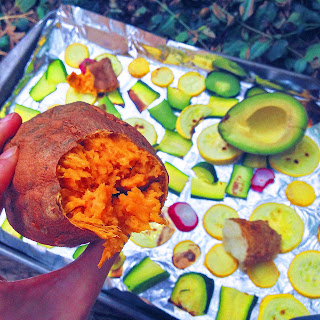 |
| A typical dinner situation... |
Now, I included the Garnet and Jewel sweet taters together because they're both very similar: they're orange/red on the inside and out, and have a mildly sweet flavor. Garnet sweet potatoes are typically more moist on the inside, though - which makes them addictively tender when you roast them whole in the oven. Jewel taters, on the other hand, are more firm.
As for nutrition, sweet potatoes are, by the numbers, arguably healthier than yams. Sweet potatoes boast lower calories and score lower on glycemic index (meaning that their carbs are released more slowly and therefore cause less spikes in blood sugar). Orange or red colored sweet potatoes like Jewel and Garnet also pack a punch of beta-carotene, which has been shown to improve blood levels of Vitamin A. Sweet potatoes' bright color has also been found to have anti-inflammatory properties. Apparently your grandma's mashed sweet potato recipe really can be a little magical.
Japanese Sweet Potato
...otherwise known as Casey's favorite potato ever. The skin of a Japanese sweet tater is typically a purple-ish color, but it has a bright white inside. I actually first tasted this variety when my mom bought it by mistake when she was looking for "regular" sweet potatoes - but I'm very glad for her mistake! These potatoes have a much firmer texture and, unlike Garnet sweet potatoes, these don't caramelize easily when roasted in the oven. However, Japanese sweet potatoes' unique flavor is just as good, in my opinion!
 |
| Another kind of buddha bowl! |
Stokes Purple Sweet Potato
Finally, my newest discover: purple sweet potatoes! I bought these on a whim when I saw them in Sprouts, and I had no idea what they would taste like - but, as it turns out, pretty good! Compared to other varieties, purple sweet potatoes aren't very sweet, and they're definitely the driest. So, be careful about overcooking them and, if you bake them in the microwave, be sure to include a some water as well.
Thanks to its brilliant color, the purple sweet potato is packed with antioxidants (three times that of blueberries, in fact!) and has been shown to help reduce damage from oxygen and metals in the digestive track. The potatoes' anthocyanins can also have an anti-inflammatory and cancer-fighting properties
Sweet Potato Recipes
When I have sweet potatoes on hand, my usual dinners involve: Loaded Baked Potatoes (the easiest way to use up leftover veggies, beans, or sauces), Salmon Sweet Potato Sliders (which can easily also be stuffed with pulled pork, mashed chickpeas, pulled jackfruit or other kinds of fish!), Sweet Potato Zucchini Patties (a great topping for salads) and leftover sweet potato fries decorating my homemade pizza (trust me: you haven't lived until you've combined fluffy sweet potatoes with a crunchy buckwheat crust).
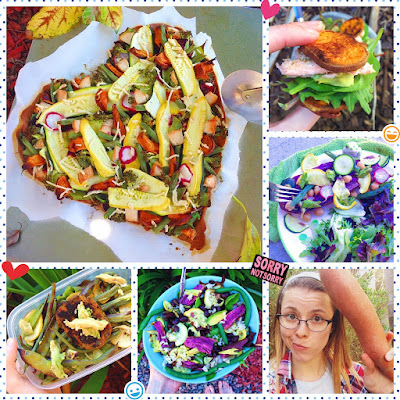 |
| Allll the sweet tater love! |
- Super Creamy Vegan Stovetop Mac & "Cheese": spoiler alert - the "cheese" actually includes blended sweet potatoes. GENIUS.
- Healthy Chai Spiced Sweet Potato Granola: you already know that I'm addicted to granola. Adding sweet potato just creates another level of obsession.
- Black Bean, Sweet Potato and Red Quinoa Soup: if you're looking for the ultimate winter comfort food, this soup should definitely be in the running.
- Vegan Sweet Potato Dates Muffins: because the best thing about sweet potatoes is definitely their ability to be sweet or savory. Double the trouble, double the yum!
- Beef and Broccoli Sweet Potato Noodles 2.0: if you've never tried sweet potato noodles, you definitely need to fix that ASAP.
- Purple Sweet Potato Gnocchi with Tahini Parsley Sauce: gnocchi has never been so gorgeous!
- Sweet Potato Breakfast Pizza Crust: when you want to get your day off to a deliciously (sweet yet savory) start.
 |
| Or a little bit of everything... |
*Also found at Wine'd Down Wednesday, Wow Me Wednesday, What's Cookin' Wednesday, RunningwithSpoons, This is How We Roll, VegetarianMama, Saucy Saturday, Snickerdoodle Sunday*
What's your favorite kind of regular or sweet potato? How do you like to enjoy your potatoes?



great roundup of potato ideas
ReplyDeleteThanks Carol! Hope you have a great weekend!
DeleteI love making sweet potato fries at home (just with salt and pepper and some seasoning, baked). They're so much tastier than regular potato fries in my opinion!
ReplyDeleteI never say no to sweet potato fries!
DeleteThis comment has been removed by the author.
ReplyDelete